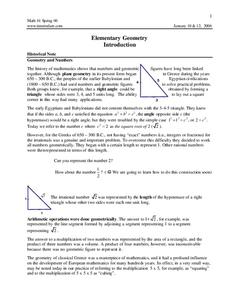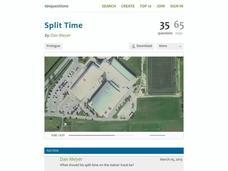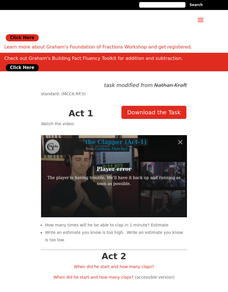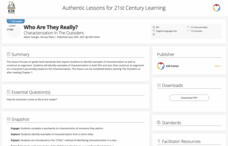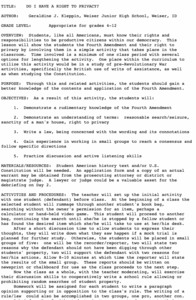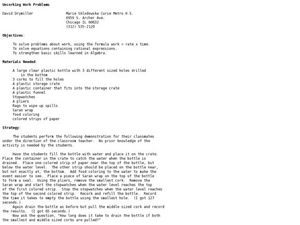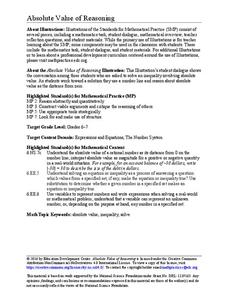Royal Society of Chemistry
Elements 1
The periodic table can be a little overwhelming to young scientists. Meet your class' worries head on by introducing the table in a game. Individuals test their knowledge of the names and symbols of common elements, then use deductive...
Royal Society of Chemistry
Mass Concentration of Solutions
Ready to teach your class about molar mass and solution concentration? Make time for an interactive resource that will challenge their reasoning and problem-solving skills. Science scholars calculate the molarity of several solutions...
K20 LEARN
Writing An Argumentative Paragraph: Argumentative Writing
Learning how to craft a cogent argument based on a solid claim, supported with evidence and solid reasoning, is an important life skill. Teach middle schoolers about argumentative writing with a lesson asking them to analyze the claims,...
Mt. San Antonio Collage
Elementary Geometry
Your class may believe that geometry is a trial, but they don't know how right they are. A thorough math lesson combines the laws of logic with the laws of geometry. As high schoolers review the work of historical mathematicians and the...
Mathed Up!
Reverse Percentages
Boost math skills and inspire scholars to show what they know with a six-page independent practice that focuses on proportional relationships and percents.
Mathematics Assessment Project
100 People
It's a small world after all. In the middle school assessment task, learners use data that imagines there are only 100 people in the world to answer questions about population demographics. Young mathematicians use ratio and proportional...
EngageNY
Mid-Module Assessment Task: Grade 8 Module 4
Determine what the class knows about linear equations. The three-question mid-module assessment is segment 15 in a 33-part series. The assessment includes writing and solving one-variable linear equations and graphing proportional...
EngageNY
Tax, Commissions, Fees, and Other Real-World Percent Problems
Pupils work several real-world problems that use percents in the 11th portion of a 20-part series. The problems contain percents involved with taxes, commissions, discounts, tips, fees, and interest. Scholars use the equations formed for...
101 Questions
Split Time
Stay on track to learn about proportions. Scholars watch an introductory video that shows the split time for a runner on an outdoor track. Applying concepts of proportional reasoning, they determine what the runner's split time would be...
Gfletchy
The Clapper
Give a round of applause for completing the task. Scholars watch a video that shows an extremely fast clapper and a timer. The activity requires applying concepts of rates and proportional reasoning to estimate the number of claps in one...
K20 LEARN
Who Are They Really?: Characterization In The Outsiders
Ponyboy, Johnny, Winston, and Darry come alive in a lesson plan that focuses on the details S. E. Hinton uses to characterize the Greasers and the Socials. The class first observes the actors' words; the thoughts revealed their effect on...
Curated OER
Do I Have a Right To Privacy?
Students, in groups, explore the Fourth Amendment and their right to privacy. They explore reasonable search/seizure, sanctity of a man's house, right to privacy.
Curated OER
Word Problem Exchange
Learners discuss elements of word problems: key words, data, computation clues, and unnecessary information and use the four steps of problem solving to find a solution and check for reasonableness.
Pennsylvania Department of Education
Problem Solving with Fractions
Solve story problems using fractions or decimals. Then, determine the reasonableness of answers using estimation.The detailed lesson includes essential questions, vocabulary, a materials list, and links to related units.
Curated OER
Top Reasons to Attend My School
Students evaluate reasons why someone would attend their school and create a marketing campaign to attract students. In this school welcome lesson, students analyze the marketing process and survey public sectors about their school....
Curated OER
Revolutionary Tea Parties and the Reasons for Revolution
Eleventh graders list some tea party protests other than the Boston Tea Party, then state some possible reasons behind the tea protests. They explain the connection between the Boston Tea Party, other tea parties, and events that...
Curated OER
Reasoning with Rules
In this reasoning with rules instructional activity, learners solve and complete 12 different problems that include applying various rules to solve the equations given. First, they assume all segments are straight and state the rule used...
Curated OER
Two Reasons for the Four Seasons
Students explore the reasons for the seasons. In this season lesson plan,students use flashlights to demonstrate the movement of the Earth and how it influences the seasons. Students label pictures and discuss what would happen if the...
Curated OER
"Let us Reason Together" Lyndon Johnson, Master Legislator
Students explore the contributions of Lyndon B. Johnson. In this congress lesson, students listen to their instructor lecture on the prowess of Lyndon B. Johnson's legislative skills. Students respond to discussion questions connected to...
Curated OER
Reason for the Seasons
Young scientists examine why we have seasons on Earth, and how the motion of the Earth around the Sun causes them. Groups of learners are given a variety of balls, a bamboo stick, a marker, and a flashlight, then use the objects to...
Curated OER
Time Zones
Students study the reason why time zones exist and how they are established. They predict time zones for different places on Earth.
Curated OER
Uncorking Work Problems
Explore the concept of work with your class, using bottles, water, and corks to calculate work, while using the formula work = rate x time. Middle schoolers conduct multiple experiments, timing how long it takes for water to drain out of...
Curated OER
Build Mastery: Purpose for Reading
Do you agree? Set up three stations in your room for this reading comprehension activity: I agree, I disagree, and I'm not sure. Learners listen to statements and walk to the sign that best describes their response. Model this with an...
Education Development Center
Absolute Value Reasoning
Teach solving absolute value inequalities through inquiry. Groups use their knowledge of absolute value and solving inequalities to find a solution set to an absolute value inequality. Working collaboratively encourages discussion,...
Other popular searches
- Deductive Reasoning Puzzles
- Deductive Reasoning
- Inductive Reasoning
- Logical Reasoning
- Proportional Reasoning
- Reason for the Seasons
- Mathematical Reasoning
- Deductive Reasoning Math
- Thinking and Reasoning
- Thinking & Reasoning
- Inferential Reasoning
- Proportional Relationships





